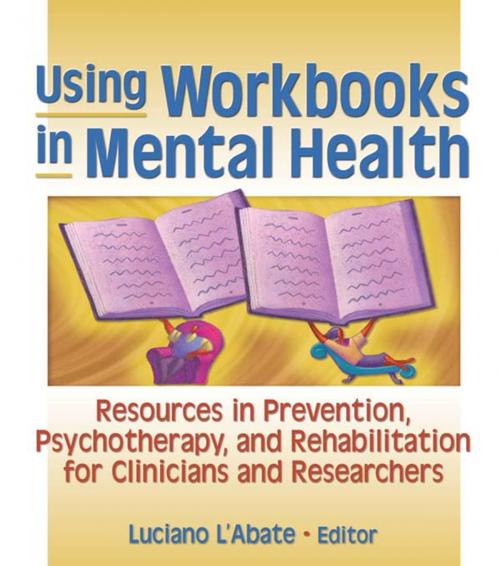Using Workbooks in Mental Health
Resources in Prevention, Psychotherapy, and Rehabilitation for Clinicians and Researchers
Nonfiction, Social & Cultural Studies, Social Science, Social Work, Health & Well Being, Psychology, Mental Health| Author: | Luciano L'Abate | ISBN: | 9781317719328 |
| Publisher: | Taylor and Francis | Publication: | January 14, 2014 |
| Imprint: | Routledge | Language: | English |
| Author: | Luciano L'Abate |
| ISBN: | 9781317719328 |
| Publisher: | Taylor and Francis |
| Publication: | January 14, 2014 |
| Imprint: | Routledge |
| Language: | English |
The use of workbooks in therapy might represent one of the biggest breakthroughs that has occurred in decades.
Using Workbooks in Mental Health: Resources in Prevention, Psychotherapy, and Rehabilitation for Clinicians and Researchers examines the effectiveness of mental health workbooks designed to address problems ranging from dementia and depression to addiction, spousal abuse, eating disorders, and more. Compiled by Dr. Luciano L’Abate, a leading authority on mental health workbooks, this resource will help clinicians and researchers become aware of the supportive evidence for the use of workbooks.
Using Workbooks in Mental Health examines workbooks designed to specifically help:
- clients affected by dementia or depression
- abused women
- gambling addicts
- women who have substance-abuse addictions
- incarcerated felons
- couples preparing for marriage
- children with school refusal disorder
- and more!
An essential reference for mental health professionals, graduate students, administrators, and researchers, Using Workbooks in Mental Health also explores the role of workbooks in psychological intervention over the past decade. Although workbooks are not yet part of the mainstream of psychological intervention, they are growing in popularity as their many advantages are recognized. They are easy to use by almost any client, they are cost-effective to both therapist and client in terms of money and time, they provide therapists with written assignments to use as homework for individuals, couples, and families, and they can be used in any setting, especially in computer-assisted offline or online interventions.
In addition, this book shows how workbooks can be used to administer therapy to previously unreachable clients such as:
- people who are reluctant to talk to an authoritative figure or a stranger
- people who cannot afford face-to-face treatments
- incarcerated offenders who have not been helped by talk therapies
- Internet users who are searching for help via computer rather than in person
The use of workbooks in therapy might represent one of the biggest breakthroughs that has occurred in decades.
Using Workbooks in Mental Health: Resources in Prevention, Psychotherapy, and Rehabilitation for Clinicians and Researchers examines the effectiveness of mental health workbooks designed to address problems ranging from dementia and depression to addiction, spousal abuse, eating disorders, and more. Compiled by Dr. Luciano L’Abate, a leading authority on mental health workbooks, this resource will help clinicians and researchers become aware of the supportive evidence for the use of workbooks.
Using Workbooks in Mental Health examines workbooks designed to specifically help:
- clients affected by dementia or depression
- abused women
- gambling addicts
- women who have substance-abuse addictions
- incarcerated felons
- couples preparing for marriage
- children with school refusal disorder
- and more!
An essential reference for mental health professionals, graduate students, administrators, and researchers, Using Workbooks in Mental Health also explores the role of workbooks in psychological intervention over the past decade. Although workbooks are not yet part of the mainstream of psychological intervention, they are growing in popularity as their many advantages are recognized. They are easy to use by almost any client, they are cost-effective to both therapist and client in terms of money and time, they provide therapists with written assignments to use as homework for individuals, couples, and families, and they can be used in any setting, especially in computer-assisted offline or online interventions.
In addition, this book shows how workbooks can be used to administer therapy to previously unreachable clients such as:
- people who are reluctant to talk to an authoritative figure or a stranger
- people who cannot afford face-to-face treatments
- incarcerated offenders who have not been helped by talk therapies
- Internet users who are searching for help via computer rather than in person















